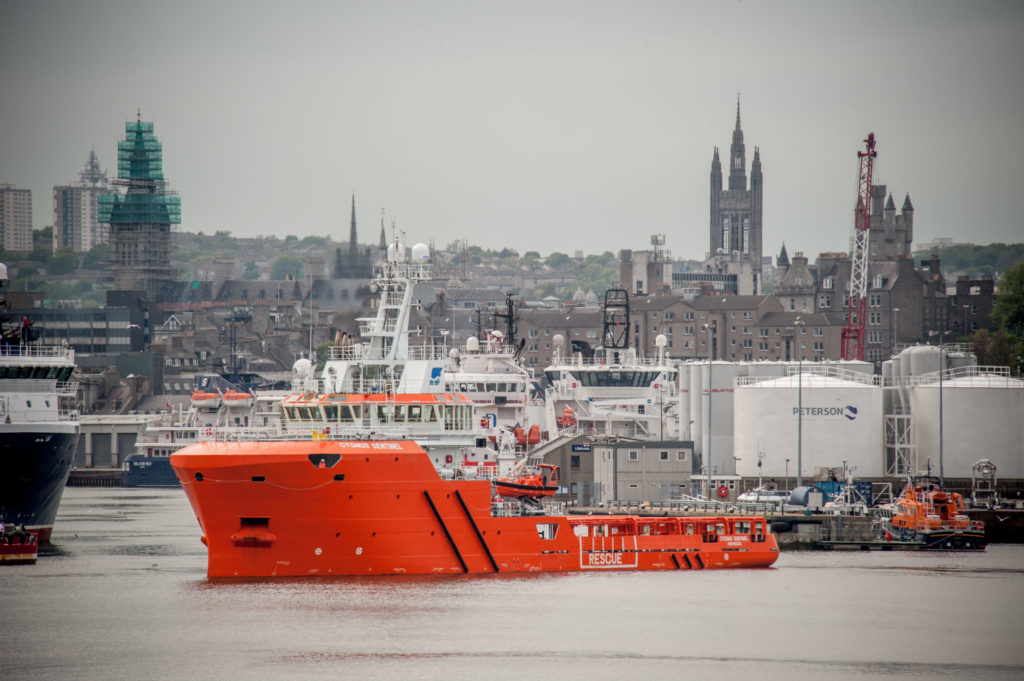
There will not be enough UK seafarers to maintain the North Sea’s offshore support vessel fleet in the event of a hard Brexit, according to an organisation for ship operators.
The Emergency Response and Rescue Vehicle Association (ERRVA) said there is a “great dependence” on crew members from other parts of Europe, and restricted access to workers would be “very detrimental” to the shipping and offshore industries.
It comes after Oil and Gas UK last month warned that a “no deal” Brexit scenario could lead to platforms needing to be shut down if there are difficulties in recruitment for “crucial” standby ERRVs.
David Kenwright, chairman of the ERRVA said: “On most offshore support vessels there are eastern European crew members.
“There are not enough UK personnel to fulfil all the posts that exist and the same thing applies to some of the posts offshore on some of the installations.
“What I can definitely say is that there are insufficient seafarers to maintain the offshore support vessel fleet if there were restrictions on some nationals coming into the UK.
“It would have a very detrimental impact on the shipping and offshore industries.”
Oil and Gas UK estimates that around seven percent of the overall offshore workforce comes from other EU countries.
For ERRVs, Mr Kenwright said that a “dependence” on European and crew members from other parts of the world such as the Phillipines has been growing “for some time”.
He added that it would be very difficult to recruit locally in the event of worker restrictions as there is little “appetite” for new-starts in the sector.
He said: “You cannot create a seaman or a navigating officer overnight, it takes a period of years. There isn’t really the appetite for new-starts in the industry. There are a number, of course, but go back 40 years there were a far more UK nationals in the industry than today.
“I think it’s down to the fact that people don’t want to be away from home for long periods.
“We’ve got a population with a very low employment rate, so they’re maybe not the types of jobs that someone from Eastern Europe, where there’s perhaps higher unemployment, would take up.
“I think it will be very difficult to recruit more people locally.”
“NOT THE FASHIONABLE THING TO DO”
However, Mr Kenwright believes the problem will not become unassailable so long as workforce restrictions are not put in place.
He said: “You have got to look at this sensibly, there’s a great dependence on eastern European staff.
“If they weren’t available it would cause problems as you do not have a population that wants to go to sea nowadays, it’s no longer a fashionable thing to do.
“There is potential for a problem but I don’t believe it will become unassailable because I don’t think legislation will be imposed that would stop EU nationals coming in to serve the industry.
“The government, I am sure, will behave responsibly and rather than insurrection in the country, they will find a way to make sure people can work in essential industries.”
One firm that feels positive about the future is Sentinel Marine, which employs 350 people offshore.
Despite 40% of its workforce coming from other parts of the world, it is “completely confident” it will be able to man its vessels no matter the Brexit outcome.
Chief executive Rory Deans said: “As the full impact of Brexit is still unclear we, like so many other businesses, have had to adopt a wait and see approach.
“However, we are completely confident that, whatever the outcome, there will be no impact on our ability to man vessels and operate our fleet of ERRVs.
“Our recruitment and retention rates are very healthy: the fact that these are brand new vessels with additional capabilities beyond the traditional ERRV role and offer a very high standard of crew accommodation and facilities, has allowed us to attract the very best talent the industry has to offer.
“Our first cadet graduated this year after three years of study and will commence employment as a ship’s engineer next month. We now have eight cadets – four deck officer and four engineer officer – who are studying towards their first certificate of competency.”
The UK will officially cease to be a member of the European Union on March 29 next year.
Recommended for you

